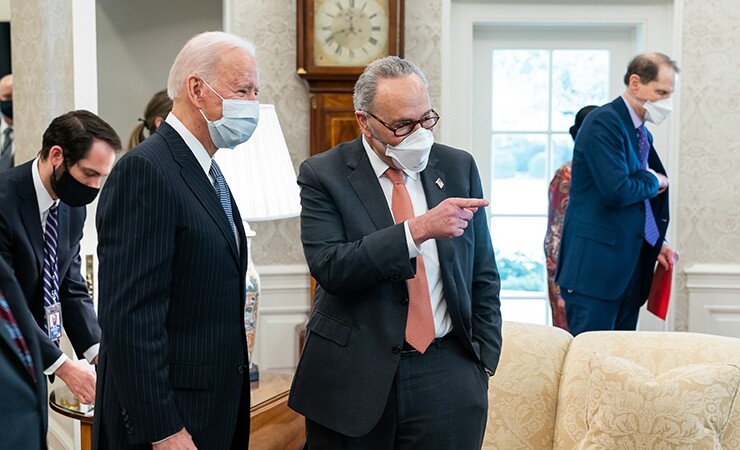
President Biden and Senate Majority Leader Chuck Schumer in the Oval Office earlier this month.
(Image credit – The White House)

President Biden and Senate Majority Leader Chuck Schumer in the Oval Office earlier this month.
(Image credit – The White House)
Senate Majority Leader Chuck Schumer (D-NY) announced
Schumer added that the package could also include “emergency funding” to implement the recently enacted CHIPS for America Act
“I want this bill to address America’s short-term and long-term plan to protect the semiconductor supply chain and to keep us number one in things like AI, 5G, quantum computing, biomedical research, storage,” Schumer remarked. He explained that he intends the package to be bipartisan and is aiming to set up a Senate vote on it this spring.
The version of the Endless Frontier Act introduced last year proposed the most significant restructuring of NSF since its establishment in 1950, renaming it the National Science and Technology Foundation and creating a new agency directorate to advance a set of “key technology focus areas.” The legislation set an initial list of 10 areas and stipulated they be refreshed every four years with input from a new advisory board.
The bill also recommended Congress allocate $100 billion to the directorate over five years, well outstripping the agency’s current annual budget of $8.5 billion. The additional funds would be channeled toward an assortment of university-led research centers, testbeds, and consortia, and a portion would be allocated through the agency’s existing directorates.
Unlike NSF’s other directorates, the technology directorate would have authorities analogous to those used by the Defense Advanced Research Projects Agency, which allows its program managers considerable leeway to drive toward targeted R&D outcomes. Typically, NSF has used external peer review of grant proposals to steer its programs.
The reception of the Endless Frontier Act in science policy circles has been mixed, with some observers worrying it could dilute NSF’s traditional focus on fundamental research. For instance, Arden Bement, a former director of NSF and the National Institute of Standards and Technology, has argued
Others have asserted the bill is premised on a flawed understanding of technological innovation. A set of such critiques were published last year by Issues in Science and Technology, a policy magazine, as part of a series
In one article, Patrick Windham, a former Senate staff member, joined two science policy scholars in arguing
In a rebuttal
In any event, the Endless Frontier Act is apt to be modified as it advances through Congress. The committees with jurisdiction over NSF have yet to formally weigh in on the bill. Among them, the House Science Committee has been preparing its own legislation to update policy for NSF and other science agencies under its jurisdiction.
There are also other ideas circulating in Congress on how to dramatically scale up technology and workforce development initiatives. For instance, Rep. Ro Khanna (D-CA), who is a co-sponsor of the Endless Frontier Act, also introduced separate legislation

President Biden holds up a computer chip during remarks he made today before signing an executive order on strengthening supply chains.
(Image credit – The White House)
In his remarks yesterday, Schumer said he has three overarching goals for the package: “enhance American competitiveness with China by investing in American innovation, American workers, and American manufacturing; invest in strategic partners and alliances: NATO, Southeast Asia, and India; and expose, curb, and end, once and for all, China’s predatory practices, which have hurt so many American jobs.”
These match the stated goals of a major competitiveness bill called the America LEADS Act
Discussing his hopes of obtaining bipartisan support for the new package, Schumer noted that the Endless Frontier Act’s co-sponsors last year included Rep. Mike Gallagher (R-WI) and Sen. Todd Young (R-IN). He added that he had discussed the new effort with Young, who he said is “eager to get it done.”
As a reason for moving quickly with the new package, Schumer pointed to concerns about the chip supply chain situation, remarking, “Semiconductor manufacturing is a dangerous weak spot in our economy and in our national security. That has to change. You’ve all seen that auto plants throughout America are closed because they can’t get the chips. We cannot rely on foreign processors for the chips. We cannot let China get ahead of us in chip production.”
Momentum is continuing to build around action to alleviate the current chip shortage, which has been attributed in part to an underestimation of demand during the pandemic. Earlier this month, 15 senators urged
Recounting the meeting, Sen. John Cornyn (R-TX) remarked
Prior to signing the order, Biden outlined
Remember that old proverb: ‘For want of a nail, the shoe was lost. For want of a shoe, the horse was lost,’ and it goes on and on until the kingdom was lost, all for the want of a horseshoe nail. … Recently, we’ve seen how a shortage of computer chips like the one I have here … has caused delays in production of automobiles that has resulted in reduced hours for American workers. A 21st century horseshoe nail.